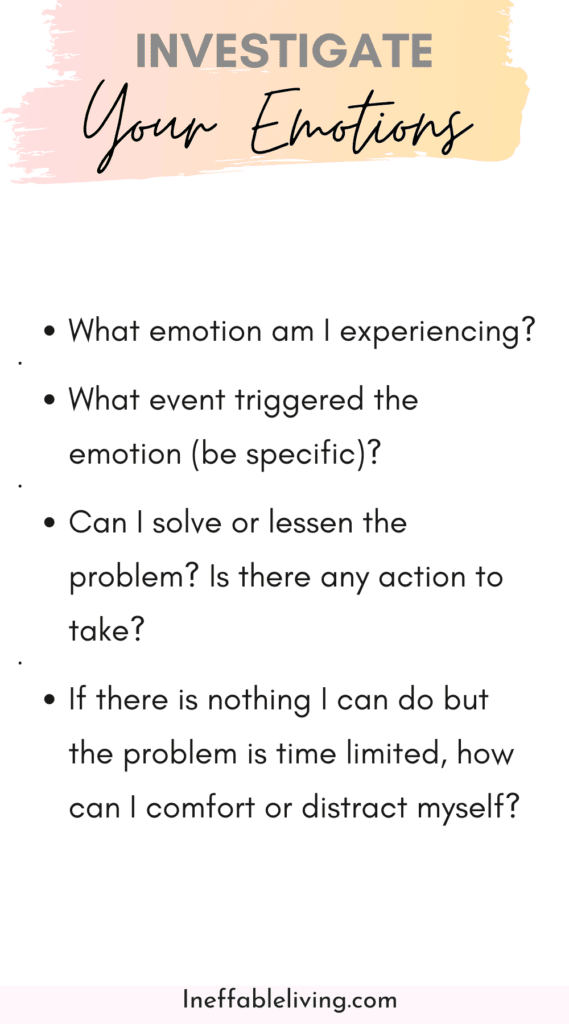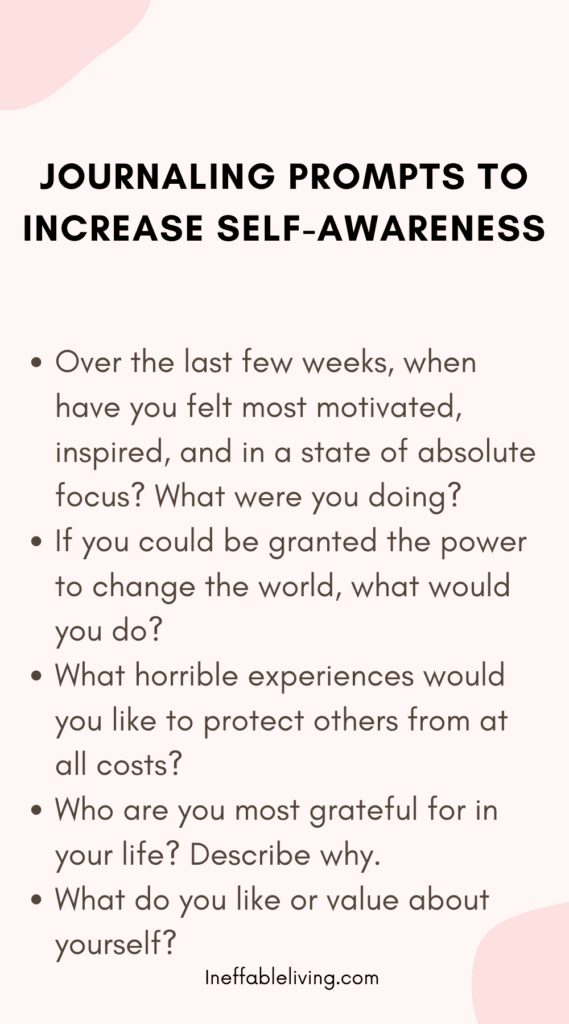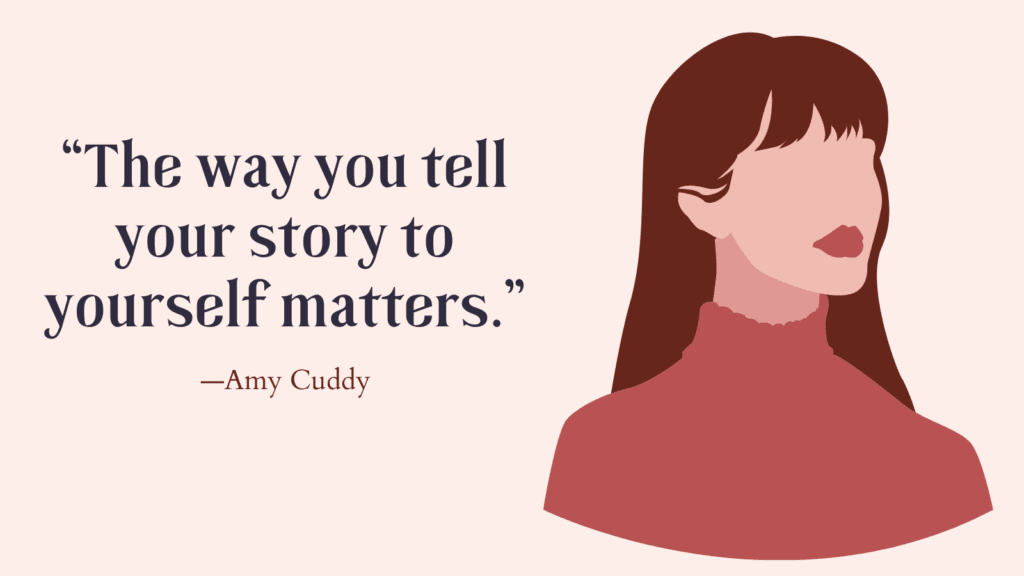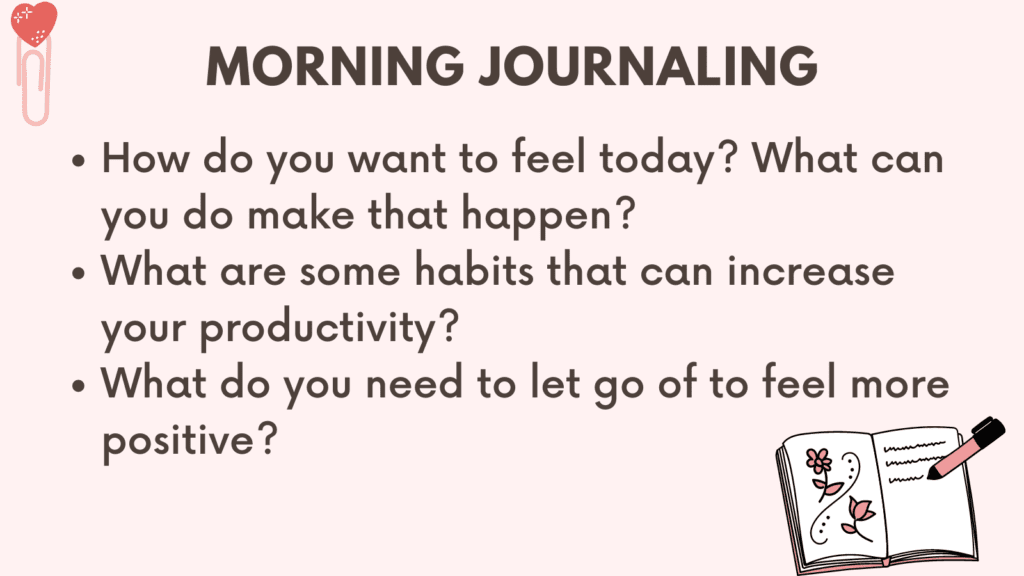Why do you need to use mental health journal prompts?
Many of us have learned to swallow our pain.
Practicing journal writing consistently will help undo the self-censorship habit.
A journal is a safe place for you to work through your feelings, without judgments or criticism.
It can serve as a confidant and guide.
Research shows that expressing your feelings on paper helps reduce your stress levels.
You start exploring your feelings by writing them in your journal. It may be the pain of disappointment, loss, grief – anything that hurts you.
Writing about your pain may bring tears. This is a sign that you’ve hit a turning point and that continuing to write will help you open your heart and heal your wounds. (*)
Other benefits of journaling include:
- Reducing overall stress
- Increasing happiness
- Achieving goals
- More problem-solving skills
- Improving memory
- Increasing emotional intelligence
- Developing self-awareness
- Healing emotional trauma (*)
- Best FREE Journaling Apps
- +100 Mental Health Journal Prompts
- #1. Journaling Prompts for Self-Awareness
- #2. Journaling Prompts to Find Your Purpose
- #3. Journaling Prompts for Self-Growth
- #4. Journaling Prompts for Emotional Health
- #5. Journaling Prompts for Mindfulness
- #6. Journaling Prompts for Self-Love
- #7. Journaling Prompts for Body-Image
- #8. Journaling Prompts for Relationships
- #9. Journaling Prompts for Finances
- #10. Bullet Journal
- GET FREE +100 MENTAL HEALTH JOURNAL PROMPTS PDF
- How To Use Mental Health Journal Prompts?
Best FREE Journaling Apps
1. Daylio
This app is ideal if you want to keep track of your life by logging your mood and daily activities.
2. Day One
The app offers an easy-to-use interface and an elegantly designed space for journaling. Day One also offers plenty of prompts for when you have no idea what to write about.
3. Reflection.app
This app syncs across mobile and desktop, making it easy to organize and search your entries.
5. Longwalks
The app offers thoughtful prompts that you can share on social media.
6. Reflect
The app offers a mix of straightforward check-in questions (such as how are you feeling) and thoughtful prompts. It also provides intelligent reports on your strengths, values through methods drawn from solution-focused coaching, leadership development theories, CBT, and positive psychology.
+100 Mental Health Journal Prompts
#1. Journaling Prompts for Self-Awareness
1. If you could talk to your younger self, you would say …
2. What is one of your strengths/weaknesses?
3. Where do you prefer to spend the most time? Why?
4. Where you wouldn’t like to spend your time? Why not?
5. What kind of people do you surround yourself with? Why do you spend time with them?
6. Who are your role models and why do you admire them?
7. Over the last few weeks, when have you felt most motivated, inspired, and in a state of absolute focus? What were you doing?
8. If you could be granted the power to change the world, what would you do?
9. What horrible experiences would you like to protect others from at all costs?
10. Who are you most grateful for in your life? Describe why.
11. What do you like or value about yourself?
Related: Raising low self-esteem: 18 Ways to Build High Self-Esteem
12. What do you do to take care of yourself physically?
13. How do you take care of yourself emotionally?
14. When you’re in pain — physical or emotional — the kindest thing you can do for yourself is…
Related: 45 Easy Self Care Day Ideas at Home for a Healthy Mind, Body & Soul
15. When times get tough you want to remember that …

#2. Journaling Prompts to Find Your Purpose
16. Are you satisfied at work? What can you do to change your work life?
17. If you don’t see your work as meaningful to you, can you think of a different type of work that would feel more meaningful?
18. What, if any, are your spiritual beliefs?
Related: Listen to Your Inner Guidance: A Beginner’s Guide To Meditation
19. How do these beliefs impact the way you live your life?
20. Are you living a life that is compatible with your spirituality?
21. What changes can you make to your life to make it more compatible with your spiritual beliefs?
22. What makes you the angriest about things in the world?
23. Which organizations or charities do you, or would you, support?
24. What mentors or public figures do you respect or admire? Why?
25. Do you spend as much time helping others as you’d like?
26. How can you be more charitable with yourself?
27. Do you want to make changes based on these thoughts?
List of positive characteristics and values
Appreciation of others • Artistic ability • Awareness of environment • Assertiveness • Balance • Being part of a community • Being in a team • Capacity to change and develop • Chilling out • Collaborating with others • Connecting with people • Creativity • Excitement • Financial management • Family commitment • Freedom • Friendship • Fun • Generosity • Helping others • Honesty • Honour • Humour • Independence • Individuality • Intelligence • Integrity • Intimacy • Kindness • Learning from experience • Looking after myself • Love • Musical ability • Networking • Not taking myself too seriously • Organizational skills • Physical health • Physical fitness • Relaxed approach and attitude • Reliability • Religious lifestyle • Risk-taking • Self-awareness • Self-expression • Sensuality • Sexuality • Sharing • Solitude • Social conscience • Standing up for rights • Spirituality • Stability • Success • Understanding
Related: How to Find Your Purpose and Passion in Life?
#3. Journaling Prompts for Self-Growth
28. What does creativity mean to you? Do you have ways in which you can express your creativity?
29. Are you satisfied with the place creativity has in your life? If not, how can you change that?
30. What value do you place on life-long learning?
31. Are you taking advantage of opportunities that evolve?
32. What do you want to do differently now that you’ve thought about learning?
#4. Journaling Prompts for Emotional Health
33. Which emotions were okay and which were not okay in your family?
34. Were vulnerable emotions (like sadness, fear, or loneliness) expressed in your family? How were these kinds of emotions responded to?
35. What are some of your beliefs about negative and positive emotion now?
Related: Regulate Your Emotions: How To Manage and Control Your Difficult Emotions?
36. What messages did your parents or caregivers give you that formed the roots of your identity and self-esteem?
37. What happened when you made mistakes as a child? Were you encouraged to learn or were you treated as a failure?
38. What did people expect of you as a child? What happened when you met those expectations?
39. What messages did you get from your culture or media about success?
40. Are you particularly sensitive to certain comments from certain people?
Related: Building Self-Confidence: How To Gain Confidence Quickly And Improve Your Self-Esteem?
41. Do you consider yourself to be an assertive person?
42. In what situations do you find it difficult to say no, even when you know you should?
43. How did your parents respond when you said no to them as a child or teen?
44. What messages did you hear or learn from my early experiences about saying no?
45. How do you feel when you want to say no but end up saying yes?
Related: How to Overcome People Pleasing for Good?
46. How do you define boundaries? Try writing your own definition.
47. What’s holding you back from setting boundaries?
48. How will setting boundaries improve your mental and physical health?
49. How does it feel to acknowledge and accept that you can’t make people do what you want— even when you set boundaries?
Related: How to Firmly Establish and Enforce Healthy Emotional Boundaries?
50. In what ways or situations do you silence your own opinions, wants, or needs?

#5. Journaling Prompts for Mindfulness
51. Which emotions have you experienced throughout the day?
52. How do you feel in your body right now?
53. What event triggered the emotion (be specific)?
54. Can you solve or lessen the problem? Is there any action to take?
55. If there is nothing you can do but the problem is time-limited, how can you comfort or distract yourself?
56. When were you fully in the moment today?
57. If you let your thoughts wander, what memory comes to mind first?
58. What mundane daily ritual could you bring your full attention to, staying completely in the moment?
Related: How to Firmly Establish and Enforce Healthy Emotional Boundaries?

#6. Journaling Prompts for Self-Love
59. What do you usually do to fill your self-care cup?
60. How did you behave toward yourself when you were hurting? Were you able to provide nurturing and validation to yourself?
Related: Self-Love Journey: How to Start Loving Yourself?
61. What makes you feel safe physically when you are alone? With others?
62. What does your inner child most need to hear from you?
63. How can you be kinder to yourself?
64. What prevents you from loving yourself?
65. What do you need to feel at peace?
#7. Journaling Prompts for Body-Image
66. How many times a day do you think about your appearance?
67. Do you like the way you look?
68. How important is appearance to you?
69. Is the appearance of your friends important to you?
70. Has your body image ever stopped you from doing something you love or trying something new?
71. Have you ever heard anyone you admire say something negative about their body?
72. What would you do if you didn’t think about your appearance?
73. What is one thing you can do today to challenge your negative thoughts about your body image?
related: 5 Steps To Overcome Body Dysmorphic Disorder (And Other Body Image Problems)

#8. Journaling Prompts for Relationships
74. How do you show concern for the people you care about?
75. Do your close relationships help you or hurt you?
76. Are you doing anything to bring loved ones closer to you?
Related: How to Get More Affection from Your Relationships?
77. Do you see value in being close to your loved ones?
78. Are you comfortable reaching out to others with emotional needs? Why or why not?
79. How communicating your emotional needs can impact your relationship?
80. What would it be like to reach out with an emotional need?
81. What experiences have you had with telling people what you need?
82. Do you believe the idea that people can function more independently if they know their partner is accessible and responsive?
83. How do you and your partner emotionally support each other?
84. How can you make yourself more available to your partner?
85. How can you increase your empathy for your partner?
86. What feels risky about sharing your fears with your partner?
87. What reassurance do you need before you can start sharing more with your partner?
88. How do you react when your relationship is threatened? And how does your reaction impacts your partner?
89. How do you cope when your partner is upset?
90. What does your partner do that helps you feel safe?
Related: Building Intimacy: How to Get and Give More of it?
#9. Journaling Prompts for Finances
91. Do you have problems with overspending?
92. Are you saving for an emergency?
93. Do you have needs that aren’t being met financially?
94. Can you do something now or in the near future to help your situation?
#10. Bullet Journal
95. Books you want to read this year
96. Home repairs to make
97. Daily affirmations
98. List of family/friends’ birthdays
99. Movies you want to stream
100. Healthy snacks list
101. Apps you love or apps to try
102. Project ideas
103. Things to do in your own city
Looking for more prompts? 200 Thought-Provoking Journaling Prompts (Printable)
GET FREE +100 MENTAL HEALTH JOURNAL PROMPTS PDF
How To Use Mental Health Journal Prompts?
Using mental health journal prompts can be a useful tool for self-reflection and improving your mental wellbeing.
Here are some steps to help you get started:
1. Choose a prompt: Look for a mental health journal that has interesting prompts or create your own prompts. Choose one that resonates with you.
2. Find a quiet and comfortable space: Set aside some time in your day, find a quiet spot where you can sit comfortably and focus on your thoughts without any distractions.
3. Start writing: Take your time to reflect on the prompt and write your thoughts down. Write whatever comes to mind, even if it seems trivial or insignificant.
4. Be honest: Be honest with yourself when answering the prompt. There’s no need to sugarcoat or hide how you’re feeling.
5. Reflect on your answers: After you’ve finished writing, take some time to reflect on what you’ve written and how it made you feel.
6. Repeat daily: Make journaling a daily habit. Writing regularly in your mental health journal can help you process your emotions and improve your mental wellbeing.
Remember, journaling is a personal journey, so there is no right or wrong way to do it.
The important thing is to use mental health journal prompts as a tool for self-reflection and self-improvement.

References
- Online Positive Affect Journaling in the Improvement of Mental Distress and Well-Being in General Medical Patients With Elevated Anxiety Symptoms: A Preliminary Randomized Controlled Trial – PMC (nih.gov)
- How Journaling Can Help You in Hard Times (berkeley.edu)
- What’s All This About Journaling? – The New York Times (nytimes.com)
- Journaling for Mental Health – Health Encyclopedia – University of Rochester Medical Center
- Benefits of Journaling for Mental Health (5 Science-Based Benefits of Journaling for Anxiety and Depression)) | Holstee
- The Mental Health Benefits of Journaling | Psych Central
- 83 Benefits of Journaling for Depression, Anxiety, and Stress (positivepsychology.com)
- Journaling isn’t just good for mental health. It might also help your physical health. (nbcnews.com)
- Benefits of Journaling: The Science and Philosophy Behind Keeping a Di – Intelligent Change





